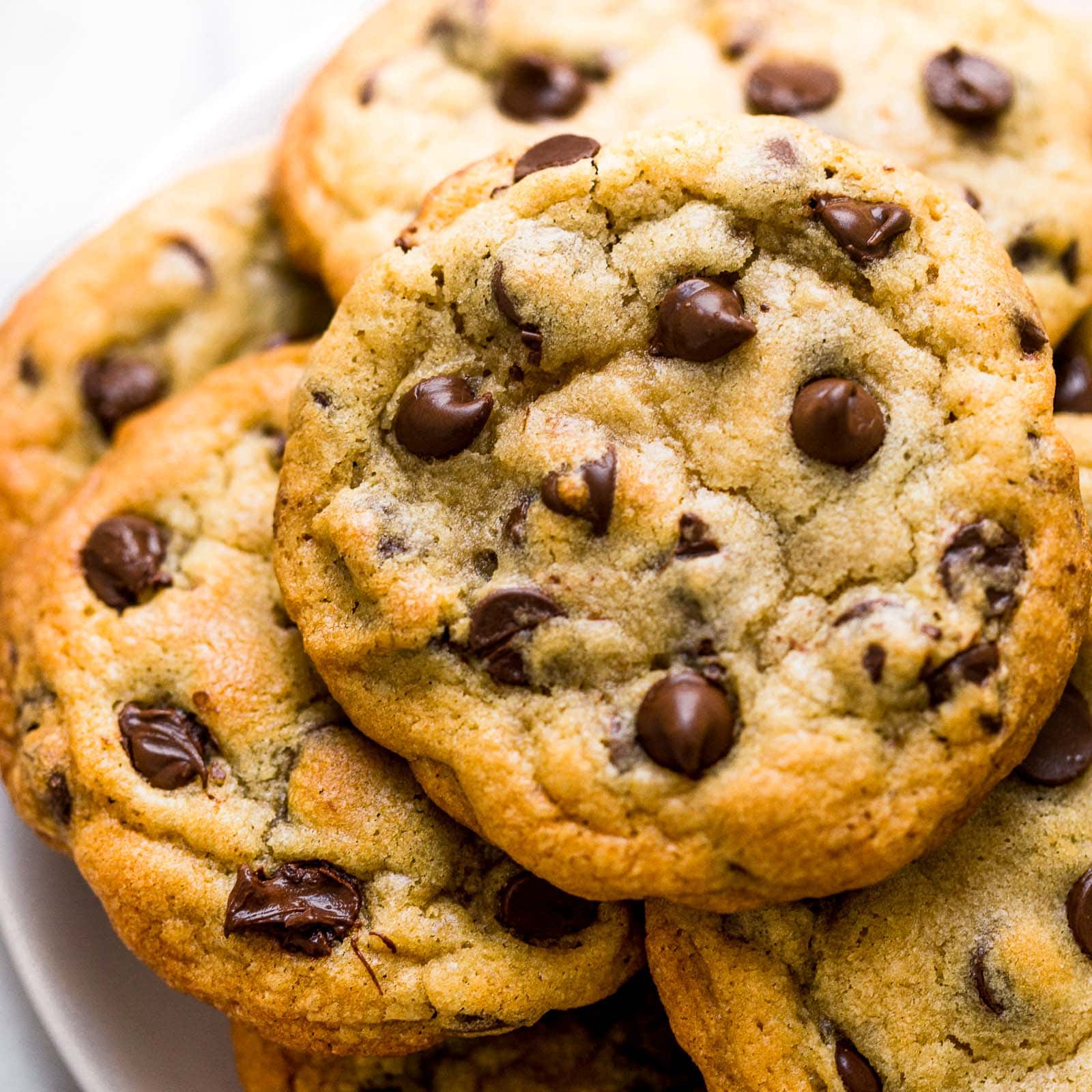
A delicious looking image
From warm laundry to an ice cream truck’s jingle, there are several smells, sights, sounds, tastes, and feelings that are universally associated with comfort. In America, the most popular cookie flavor, chocolate chip, similarly alleviates stress… and quite a lot of it considering 7 billion of these cookies are consumed each year!

Other factors to consider!
Even though no one in my family has a huge sweet tooth, we enjoy making chocolate chip cookies with cranberries and walnuts every once in a while. We usually use bittersweet chocolate instead of milk chocolate chips to add a sharper flavor. The taste of melty, chocolatey goodness is always guaranteed to melt away the anxiety from a stressful week! Interestingly, each batch of cookies tastes slightly different even though we follow the exact same recipe each time. Sometimes, they even look completely different depending on the baking tray we use or if my brother adds more chocolate chips than the recipe demands. Through the years of baking, I’ve learned that being careful and avoiding as much human error as possible rewards consistent batches of cookies!
Many of us have probably heard of cooking being compared to chemistry before! In the same way that adding extra of one element results in a new compound, food is very sensitive to changes in ingredients. Recently, I found this diagram about cookie ingredients on the internet that reminded me of my family’s inconsistent cookies in the past. Although it’s probably safe to say that people typically don’t go overboard on beans, the other ingredients are interesting to consider in order to optimize your chocolate chip cookies!
GRANULATED SUGAR
Adding more sugar is a good thing since it will make your cookies flatter and lighter-colored. I prefer softer cookies, but sugar will also crisp your cookies up! Sugar is hygroscopic, which means that it absorbs moisture from its surroundings. As a result, it attracts a lot of the liquid in cookie dough, slowing down the development of flour. Brown sugar is even more hygroscopic than white sugar but results in a more moist and chewy cookie. While this seems counterintuitive, the molasses that causes the brown color of brown adds moisture and acidity to the dough! However, it’s always good to regulate the amount of sugar so that your cookies aren’t overly sweet.

A web of gluten! (Looks sticky)
FLOUR
This ingredient can make or break the texture of your chocolate chip cookies. Flour contains gliadin and glutenin. When mixed with water, these two proteins combine to form long strands or large matrices of gluten. This web traps carbon dioxide released during the baking process and helps cookies rise. The perfect ratio of flour to other ingredients in the dough will result in a chewy, crisp cookie!
BAKING POWDER

Similar in appearance! Different in effect
This reactive ingredient which contains sodium bicarbonate and acidic salts results in a cookie that’s softer, thicker, and slightly harder. These two elements react with each other in two separate stages. The first stage happens when the powder first comes in contact with the dough and the second one occurs once the dough is heated in the oven—making it convenient for bakers who aren’t able to cook their cookies immediately!
BAKING SODA
To be very honest, I never understood the difference between baking soda and baking powder until writing this blog. Although these two ingredients have similar names, baking soda releases carbon dioxide that helps the dough rise! If your goal is to make a soft fluffy cookie, it’s recommended to work quickly and mix immediately after baking to prevent your cookies from falling flat.

A cookie baker!
This is simply a starting point, definitely not an absolute list of the ingredients that affect a chocolate chip cookie! In fact, there are many other factors including mixing, shaping, spacing, cook time, temperature, equipment, oven position, and cooling. It was fascinating to learn about how cooking can be broken down into science during the course of writing this blog post. Here’s to hoping that our next batches of chocolate chip cookies turn out optimal!
Works Cited:
“6 Ingredients That Affect Your Cookies: Home Made Simple US.” Homepage, www.homemadesimple.com/kitchen/6-ingredients-that-affect-your-baking/
Stephen. “The History of Chocolate Chip Cookies.” Kitchen Project, Kitchen Project, 31 May 2018, www.kitchenproject.com/history/ChocolateChipCookie/.

Hi Alayna,
Similarly to you, chocolate chip cookies have symbolized comfort and happy times for me growing up, whether it be at my house, my grandma’s house, or even a friend’s house. One of my favorite childhood memories includes baking both chocolate chip cookies and oatmeal raisin cookies with my grandma, then waiting for them to cool, and then finally getting to eat them. In addition, I thought it was interesting that you suggested adding cranberries and walnuts to the recipe, this is definitely something I will have to try, as I agree it would add a nice fruity flavor. Finally, it was helpful that you included instructions on how to make your cookies better, as I have made some big mistakes in the past, including one time I added salt instead of sugar and the cookies came out horrible. Overall, I thought this was a very informative post and I look forward to possibly trying out some of your tips the next time I decide to bake!
Hi Alayna,
I don’t usually think of myself as someone with a sweet tooth, but chocolate chip cookies have always remained that one exception throughout my life. I love the taste of a warm chocolate chip cookie, and I think it’s really amazing that you researched what exactly makes them so great. I’ve never tried using bittersweet chocolate instead of milk, but I do like dark chocolate for the sharp flavor you described, so maybe I’ll try it out one day!
Hi Alayna!
I have always been curious as to how the ingredients of a cookie come together, especially chemically speaking. This guide satisfied both my scientific curiosity, and also gave me a great guide to how to make the perfect cookie! My family has always been fantastic bakers, which is a tradition I hope to carry on. I will definitely be referring back to this blog so that I know exactly what steps to take to get the perfect cookie texture and taste. It’s really cool to see how the different chemistry of each ingredient gives it a different effect so that you can fine-tune your recipe to make the perfect cookie. Though, hopefully I am able to apply this knowledge before I put the cookies in the oven rather than only knowing afterwards what I should have done based on the way the cookies turn out.
Hey Alayna!
Chocolate chip cookies?! Say no more. As a bona-fide cookie lover, I am completely fascinated to know that I have never actually had, or at least cannot recall, having a “perfect cookie” as per your second image. This is, honestly, an exciting thought. How good must the perfect cookie be if I’m a cookie lover of sub-par cookies?
But in all seriousness, reducing human error in such a human task as baking cookies seems quite difficult, and the science behind the vastly different results is a fascinating testament to how difficult that actually is. Mad respect for bakers! I wonder then, if machines are more apt for baking than humans are, as they have precision and repeatability that we cannot compare with. Maybe a project for the future…
Hi Alayna,
I came across this blog shortly after eating a chocolate chip cookie. Well to be more accurate, a chocolate chip cookie, plus a double chocolate cookie, red velvet cookie, peanut butter cookie, m&m cookie, and a white chocolate nut cookie, so basically I have had a lot of cookies today! Unfortunately though, they were all store bought cookies! Homemade cookies are so much better but I can never get the right recipe! Everything I try always tastes off in some way, so I will definitely be using your tips to hopefully make the perfect chocolate chip cookie! I also agree, dark chocolate chips are the way to go.